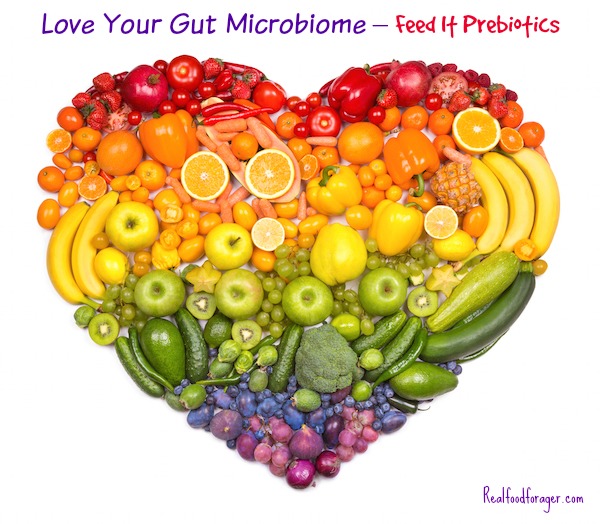With the emerging microbiome research, we can begin to appreciate the practical clinical applications in using specific prebiotics in order to support specific human microbiota.
This is critically important when it comes to figuring out which bacteria are nurtured by which foods (prebiotics) and how they directly affect human health.
Prebiotics are Critically Important in Feeding the Microbiota
We have known about the use of prebiotics for years – the use of fructooligosaccharides (FOS) has been around for at least 30 years (now I am dating myself).
What are Prebiotics?
Prebiotics are defined as a selectively fermented ingredient that results in specific changes in the composition and/or activity of the GI microbiota, thus conferring benefit(s) upon host health. Prebiotics are usually non-digestible carbohydrates, oligosaccharides or short polysaccharides, with inulin, oligofructose, galactofructose, galacto-oligosaccharides and xylo-oligosaccharides being some of the most intensively studied. (source)
When I first started practicing, I used a prebiotic of FOS from a high quality vitamin company I was working with. I handed it out to many patients only to get complaints about mild to severe flatulence and gas from the product (which I also experienced – not fun).
Needless to say, I stopped using the product and stuck to probiotics entirely.
With our greater understanding about prebiotics, and better dietary knowledge, we can now recommend products and foods with more confidence.
Recent Studies Using Prebiotics
Xylooligosaccharides (XOS) are emerging as an important prebiotic for humans, especially because they seem to support bifidobacteria in the colon.
This study published in the International Journal of Food Sciences and Nutrition, in 2015, suggests that the prebiotic XOS may be beneficial in stimulating intestinal Bifidobacterium without having much effect on Lactobacillus.
This previous study published in Food and Function in 2014 supports these same findings, noting that the human subjects experienced no gastrointestinal side effects and the use of a relatively low dose to achieve increases in Bifido populations.
Arabinoxylan-oligosaccharides (AXOS) are considered important fiber. A
A study in Critical Reviews in Food Science and Nutrition in 2011 also mentions arabinoxylans (AX) from cereals. AX and arabinoxylan-oligosaccharides (AXOS) are cell wall components – both an important part of the dietary fiber intake in humans. The researchers note,
that AXOS and XOS exert prebiotic effects in the colon of humans and animals through selective stimulation of beneficial intestinal microbiota. In addition, in vitro experiments and in vivo intervention studies on animals or humans are discussed that have investigated potential health-related effects resulting from the dietary intake of AX, AXOS, or XOS.
This study published in the Journal of Nutrition in 2012 investigated the effects of the consumption of bread with and without AXOS for 3 weeks. The results showed that the group eating the bread with the prebiotic AXOS had significantly increased fecal total short chain fatty acid(SCFA) concentrations with an emphasis on the critically important SCFA, butyrate. There were also increased levels of bifido bacteria and increased stool frequency (good for those with constipation)!
GI Tract is Typically Seen As a Two phylum System – Firmicutes and Bacteroidetes
However, there can be members of at least 10 different phyla that have important functional contributions to the microbiome. We still need to look at further classes and also viruses (the virome) and micro-eukaryotes (protozoa and fungi).
Research shows that ratios of Firmicutes to Bacteroidetes varies greatly between individuals. We are coming to the conclusion that diversity is critical to good bacterial health and that all the different strains may work together to the benefit of the host.
We also know that even the loss of one important strain can wreck havoc on a person’s health. For instance, the absence or depletion of Faecalibacterium prausnitzii, belonging to the Firmicutes phylum and considered to be anit-inflammatory, has been associated with inflammatory bowel disease (IBD). (source) (source)
Kiwi as a Source of Support for F. prausnitzii
Presently there is research (patent pending) occurring in New Zealand to produce a prebiotic powder made from gold or green kiwi to support the growth of
Additionally, the inventors have discovered that GoId3 gold kiwifruit powder influences the growth pattern of gut microflora, stimulating an increase in beneficial bacteria relative to harmful bacteria (see Example 3). Notably, the inventors have also observed a significant increase in the relative abundance of Faecalibacterhim prausnitzii in faecal samples of constipated patients treated with Gold3 gold kiwifruit powder. This increase in beneficial bacteria, including F. prausnitzii, has been confirmed by quantitative PCR analysis. (source)
That being the case, I think I will immediately start to recommend eating more kiwi fruit on a daily basis. It appears that the nutritional profile of kiwi is hugely in support of the microbiome, along with high amounts of vitamin C and E and anti-oxidants.
It’s a win-win situation – get a great tasting and nutritious food that supports a critical strain of bacteria that is absent in many people with IBD, IBS and other digestive disorders!
What are Other Prebiotic Foods?
Much ado has been made for adding fiber to your diet to improve health in regards to diabetes, heart disease , cholesterol lowering (questionable value), cancer (also some find it protective, some not) and metabolic syndrome. While there are studies supporting these health claims, there are also studies that indicate that too much fiber can exacerbate certain conditions, such as, diverticulosis, constipation and mineral absorption in general (due to the phytic acid in many fibers).
Prebiotic foods have fiber. There are many kinds of fiber, i.e. soluble fiber, insoluble fiber and resistant starch (really just another name for insoluble fiber).
Prebiotic foods provide fiber – eat plenty of root vegetables, onions, garlic, leeks, asparagus and resistant starch (if you are not on SCD or GAPS).
When introducing more fiber into your diet you must go slowly.
Find out more about fiber and resistant starch here.
Get the Most Current Information about the Microbiome
Are you as fascinated by the microbiome as I am? Are you hoping for a cure through this new research explosion?
Learn how to make bone broth and soups full of collagen and gelatin in my ebook Beyond Broth – on sale today!
Check out my newest ebook, Heal Your Microbiome Optimize Your Health – on sale today!
Like this article? Get many more and tons of information and instructions on using grain free flours in my fantastic kindle books. You don’t need a kindle to read them, as Amazon offers a FREE reader for all devices, on the sales page for each book.
Grab my kindle books here!
Grain Free Paleo Breads
Grain Free Paleo Snacks
Grain Free Paleo Desserts and Treats
These recipes are suitable for Paleo, SCD, GAPS and all grain free eaters.
Disclaimer — Please Read











